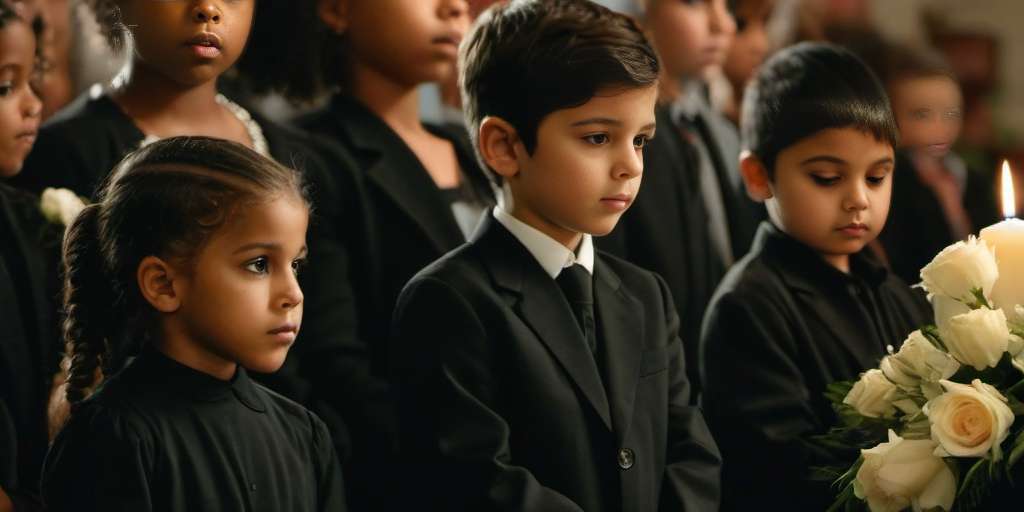Losing a loved one can greatly impact children, and it’s important for parents and caregivers to support them during the grieving process. This article provides tips on helping children behave at funerals and processing their emotions in a healthy way. Understanding their unique grief process and tailoring support to their age group is crucial. By discussing the purpose of funerals, preparing them emotionally, and encouraging expression of feelings, we can help children navigate this difficult experience. Supportive strategies and maintaining open communication about death and grief are also essential.

Understanding Grief in Children
Differences in Children’s Grief Process
Children’s experience of grief differs from that of adults. It is important to recognize that their emotional response may vary depending on their developmental stage. Infants may become more dependent and experience changes in sleep patterns. Preschoolers may show irritability, developmental regression, and separation anxiety. School-aged children may exhibit anxiety, denial, guilt, anger, and difficulty concentrating. Adolescents and young adults may struggle with conflicts, engage in risky behaviors, and feel pressure to take on more responsibilities.
Emotional Reactions and Behaviors by Age
Grief manifests differently in children at different ages. Understanding their emotional reactions and behaviors can help parents and caregivers provide appropriate support. Babies may cry more often and seek increased comfort. Toddlers and preschoolers may express grief through regressive behaviors and fears. School-aged children may display emotions such as sadness, anger, and withdrawal. Adolescents may exhibit mixed emotions and difficulty expressing grief openly.
Supportive Strategies for Children in Grief
Supportive strategies are crucial in helping children cope with grief. Creating a safe and supportive environment is important, where children feel loved and understood. Maintaining routines and setting limits can provide a sense of stability. Open and honest communication about death and grief helps children process their emotions. Encouraging the expression of feelings and facilitating the remembrance of the deceased loved one are also important strategies to support children in their grief journey.
Helping Children Navigate Funerals
Discussing the Purpose and Events of Funerals
Talking to children about the purpose and events of funerals is an essential step in preparing them for the experience. Use age-appropriate language and explanations when discussing death and funeral rituals. Clearly communicate what will happen during the funeral, such as the gathering, ceremony, and burial. Assure children that they have a role and can participate in honoring the deceased.
Preparing Children Emotionally
Emotional preparation is crucial to help children navigate funerals. Encourage them to express their feelings and concerns about attending the event. Provide reassurance and support, emphasizing that their emotions are normal and valid. Discuss the emotions they may encounter at the funeral, such as sadness, grief, or confusion. Teach them coping strategies and offer comfort to help them feel more secure.
Encouraging Expression of Feelings and Memories
Allowing children to express their feelings and memories about the deceased is an important part of their grieving process. Encourage them to share stories, write letters, or draw pictures as a way to remember and honor the person who has passed away. Create a safe and non-judgmental environment where they can freely express their emotions and memories, fostering healing and closure.
Supporting Children During Funerals
While attending a funeral, children may experience various emotions and reactions. It is crucial to provide them with support throughout the process. Stay attuned to their needs and emotions, offering comfort and reassurance. Be prepared to step out of the ceremony if they become overwhelmed or need a break. Encourage them to participate in appropriate ways, such as placing flowers or writing messages for the deceased.
Remember, helping children navigate funerals requires sensitivity, patience, and understanding. By discussing the purpose of funerals, emotionally preparing them, encouraging expression of feelings and memories, and providing support during the event, parents and caregivers can help children process their grief and navigate the funeral experience in a healthy way.
Tailoring Support to Different Age Groups
Infant and Toddler Care at Funerals
For infants and toddlers, it’s important to prioritize their need for comfort and stability. Providing a familiar and secure environment can help them feel safe during the funeral. Keeping their routines as consistent as possible and having familiar caregivers nearby can offer support.
Some strategies for infant and toddler care at funerals include:
- Bringing familiar toys or objects that provide comfort
- Ensuring they have frequent opportunities for rest and feeding
- Maintaining a calm and quiet atmosphere
- Having a caregiver available to provide nurturing and soothing
Preschooler and Kindergarten-Aged Children at Funerals
Preschoolers and kindergarten-aged children may have a basic understanding of death but may struggle with fully comprehending its finality. They may also exhibit behaviors like regressing in development or expressing fears and anxieties.
Supporting preschoolers and kindergarten-aged children at funerals entails:
- Using simple and age-appropriate language to explain death
- Preparing them for what to expect during the funeral
- Offering reassurance and comfort when they display anxiety or fear
- Including them in commemorative activities, such as drawing pictures or sharing memories
School-Aged Children and Adolescents at Funerals
School-aged children and adolescents have a better understanding of death but may still struggle with managing their emotions. They may exhibit a range of reactions, including anxiety, anger, or guilt.
Support strategies for school-aged children and adolescents include:
- Encouraging them to express their feelings through journaling or artwork
- Allowing them to actively participate in funeral-related decisions, such as writing a eulogy or selecting music
- Providing a safe space for discussions and answering their questions honestly
- Offering ongoing support and understanding as they navigate their grief
Young Adults and Adolescents Coping with Loss
Young adults and adolescents may have a complex understanding of death and may grapple with a range of emotions. They may also face unique challenges such as conflicts with family or peers, as well as increased responsibilities.
To support young adults and adolescents coping with loss:
- Encourage open and honest communication about their grief
- Validate their feelings and provide non-judgmental support
- Offer resources for additional support, such as counseling or support groups
- Encourage healthy coping mechanisms, such as engaging in activities they enjoy or seeking creative outlets
Strategies for Parent and Caregiver Support
Creating a Safe and Loving Environment
When supporting children during the grieving process, it is crucial for parents and caregivers to establish a safe and loving environment. This involves providing emotional comfort, reassurance, and physical presence. Creating a consistent routine and maintaining a sense of stability can offer a sense of security to children. Additionally, showing unconditional love and understanding helps children feel supported and encourages healthy emotional expression.
Maintaining Routines and Limits
During the grieving period, it is essential to maintain existing routines and set clear boundaries for children. Consistency provides a sense of normalcy amidst the challenging circumstances. By adhering to familiar schedules and limits, parents and caregivers can help children feel grounded and maintain a sense of control in their lives. This stability aids in coping with grief and promotes overall well-being.
Open and Honest Communication about Death and Grief
Open and honest communication is vital when discussing death and grief with children. Parents and caregivers should provide clear and age-appropriate explanations about the concept of death and address any questions or concerns the children may have. Using simple and direct language, avoiding euphemisms, and allowing space for open dialogue creates a safe environment for children to express their emotions and seek understanding. It is important to validate their feelings and offer them support throughout the process.
Facilitating Remembrance and Coping with Loss
Facilitating remembrance activities can help children cope with loss. Encouraging children to share memories, create artwork, or engage in rituals that honor the deceased can provide a sense of closure and allow for healthy grieving. Giving children the opportunity to express their emotions through various forms of expression, such as writing letters or participating in memorial services, helps them process their grief. Providing resources and assistance in creating meaningful ways to remember the lost loved one promotes healing.

Proper Funeral Attire: Etiquette Tips for Dressing Respectfully

Respectful Behavior at Memorial Services: Etiquette Guidelines for appropriate behavior in the US

Writing Condolence Letters: Expressing Sympathy and Support

Expressing Sympathy: appropriate gestures and gifts including flowers and donations
